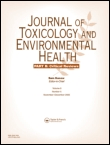
JOURNAL OF TOXICOLOGY AND ENVIRONMENTAL HEALTH-PART B-CRITICAL REVIEWS
Scope & Guideline
Advancing understanding in toxicology and environmental health.
Introduction
Aims and Scopes
- Toxicological Impact Assessment:
Focuses on assessing the toxic effects of various environmental contaminants, including chemicals, nano-materials, and particulate matter, on human health and ecological systems. - Environmental Risk Evaluation:
Investigates methodologies for evaluating health risks associated with exposure to environmental pollutants, providing frameworks for decision-making in public health and safety. - Microbiome and Health Interactions:
Explores the relationships between environmental stressors and the microbiome, particularly how these interactions may influence neurological and systemic health outcomes. - Occupational Health Studies:
Reviews the health effects of occupational exposures, including those in high-risk industries like firefighting and manufacturing, emphasizing the need for better protective measures and risk management. - Innovative Therapeutic Approaches:
Investigates novel therapeutic strategies, including the use of nanoformulations and natural products, for mitigating the health effects of toxic exposures and improving treatment outcomes.
Trending and Emerging
- Microplastics and Human Health:
Recent publications are increasingly focusing on the health effects of microplastics, examining their systemic impacts and interactions within biological systems, which is critical given the rising concern over plastic pollution. - Neurotoxicology and Environmental Stressors:
There is a growing emphasis on understanding how environmental stressors, such as air pollution and noise, affect neurological health, signaling an increased awareness of the neurotoxic effects of environmental contaminants. - Innovative Biomonitoring Techniques:
Emerging research is exploring new biomonitoring methods to assess exposure to environmental toxins, particularly in occupational settings, reflecting advancements in analytical technologies and a push for better health surveillance. - Integrative Health Approaches:
The integration of microbiome research with environmental health studies is trending, emphasizing the interconnectedness of gut health and environmental exposures, which may offer new insights into disease prevention. - Systematic Reviews and Meta-Analyses:
An increase in systematic reviews and meta-analyses is evident, showcasing the journal's commitment to synthesizing existing knowledge and providing comprehensive evaluations of health risks associated with various environmental factors.
Declining or Waning
- Traditional Chemical Risk Assessments:
There is a noticeable decrease in publications focusing solely on traditional chemical risk assessments without integrating newer methodologies or environmental considerations, indicating a shift towards more comprehensive, multi-faceted approaches. - Historical Toxicology Studies:
Research that primarily reviews historical data or case studies without applying contemporary analytical techniques or current environmental contexts is becoming less frequent, suggesting a move towards more relevant and innovative research. - Conventional Environmental Monitoring Techniques:
The focus on conventional monitoring techniques for environmental pollutants is declining, with a growing preference for advanced methodologies that incorporate toxicokinetics and effects on biological systems. - Generalized Environmental Health Reviews:
There is a reduction in generalized reviews that do not provide specific insights or novel findings, as the journal's emphasis shifts towards more targeted and detailed assessments of emerging contaminants.
Similar Journals
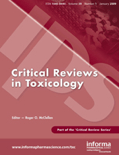
CRITICAL REVIEWS IN TOXICOLOGY
Driving Knowledge Forward in the Realm of ToxicologyCRITICAL REVIEWS IN TOXICOLOGY, published by Taylor & Francis Ltd, stands as a preeminent journal within the field of toxicology, boasting an impressive Q1 ranking and holding the distinction of being ranked 12th out of 133 in the toxicology category according to Scopus, placing it in the top 91st percentile. With a continuous publication history since 1971 and a commitment to providing high-quality reviews, the journal offers critical insight into the latest research and advancements in toxicological sciences. While it is not an open-access journal, it provides numerous access options for both subscribers and institutions, ensuring that its extensive articles are widely available to the academic community. The journal's objectives are to disseminate comprehensive reviews that foster understanding and innovation in the assessment of chemical risks, environmental impacts, and the mechanisms of toxicity, making it an invaluable resource for researchers, professionals, and students dedicated to the science of toxicology.
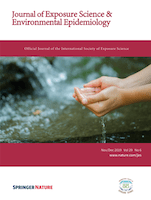
Journal of Exposure Science and Environmental Epidemiology
Exploring the Impact of Environmental Factors on Human HealthJournal of Exposure Science and Environmental Epidemiology, published by SPRINGERNATURE in the United Kingdom, is a leading platform for researchers and practitioners dedicated to understanding the interplay between environmental factors and human health. With an impressive impact factor and Q1 and Q2 rankings across multiple categories such as Pollution and Public Health, the journal has established itself as a critical resource in the fields of epidemiology, toxicology, and environmental science. Covering a wide spectrum of studies from 2006 to 2024, it aims to disseminate timely research that empowers professionals and informs policy decisions. Although there is no open access option at this time, the journal's rigorous peer-review process ensures that only high-quality research is published, further cementing its reputation as a vital source of knowledge for advancing public health and environmental protection.
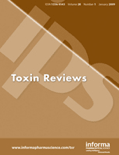
Toxin Reviews
Exploring the Complexities of ToxinsToxin Reviews is a premier academic journal focused on the critical field of Toxicology, published by Taylor & Francis Inc. Established with an aim to foster research and disseminate knowledge, this journal has been pivotal since its inception in 1982 and continues to be a leading platform for both emerging and established researchers. With an impressive impact factor and ranked in the 75th percentile among its peers in the Scopus categories, it serves as an essential resource for scientists, practitioners, and students interested in understanding the complexities of toxins and their effects on health. The journal provides an Open Access platform, enhancing visibility and accessibility of research findings to a broader audience. Covering a wide scope, Toxin Reviews plays a vital role in bridging gaps between toxicological research and practical applications, ensuring that rigorous scientific inquiry translates into real-world solutions.
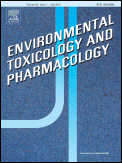
Environmental Toxicology and Pharmacology
Illuminating the science behind pollutants and health.Environmental Toxicology and Pharmacology, published by Elsevier, is a leading journal dedicated to advancing our understanding of the effects of environmental pollutants on biological systems. With an ISSN of 1382-6689 and an E-ISSN of 1872-7077, this journal covers a wide range of studies related to toxicology, pharmacology, and environmental health. The journal is classified as Q2 in key categories such as Health, Toxicology and Mutagenesis and Medicine (miscellaneous), and sits impressively in Q1 for Toxicology, reflecting its strong impact in the field. As of 2023, it ranks #30 out of 133 in Toxicology and #40 out of 148 in Health, indicating its high relevance and contribution to research. While the journal is not currently open access, it remains a pivotal resource for researchers, professionals, and students seeking to explore the intricacies of environmental health effects. Its commitment to publishing high-quality peer-reviewed research positions it as a crucial platform for scientific dialogue and discovery.
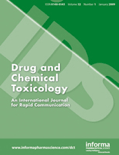
DRUG AND CHEMICAL TOXICOLOGY
Bridging disciplines for safer environments.Drug and Chemical Toxicology is a well-respected journal in the fields of toxicology, pharmacology, and public health, published by Taylor & Francis Ltd. Since its inception in 1978, this journal has diligently explored the effects and mechanisms of chemical exposures on health and the environment, fulfilling a crucial role in advancing scientific understanding and safeguarding public health. The journal is indexed across prestigious databases and features an impressive array of articles categorized within the Q2 and Q3 quartiles across various categories in 2023, reflecting its significance in Chemical Health and Safety as well as Environmental and Occupational Health disciplines. With an extensive reach and a focus on interdisciplinary research, Drug and Chemical Toxicology offers a rich repository of original research, reviews, and methodological advancements, catering to a diverse audience of researchers, professionals, and students dedicated to the betterment of safety and health standards. Although not an open-access publication, its articles are widely accessible to the academic community, ensuring that critical innovations and insights are shared for the greater good.

Exposure and Health
Innovating research to inform global health practices.Exposure and Health is a pioneering journal published by Springer, specializing in the interdisciplinary fields of health, toxicology, and environmental sciences. With an ISSN of 2451-9766 and E-ISSN of 2451-9685, this open-access journal exemplifies a commitment to disseminating high-quality research that informs public health practices and policies globally. Situated in the Netherlands, it boasts an impressive impact factor and ranks in the top quartile (Q1) across multiple categories in the 2023 Scopus rankings, including Health, Toxicology and Mutagenesis, Pollution, and Water Science and Technology. The journal is dedicated to advancing knowledge on the interactions between environmental factors and health outcomes, making it a vital resource for researchers, professionals, and students in these critical fields. Exposure and Health actively encourages submissions that address the challenges of exposure assessment, risk management, and the promotion of sustainable public health initiatives.

BULLETIN OF ENVIRONMENTAL CONTAMINATION AND TOXICOLOGY
Championing the fight against environmental contamination.BULLETIN OF ENVIRONMENTAL CONTAMINATION AND TOXICOLOGY, published by SPRINGER, is a pivotal journal in the fields of Environmental Science, Toxicology, and Public Health. With a strong history of dissemination since its inception in 1966, the journal predominantly focuses on the latest advances in understanding environmental contaminants and their toxicological effects on health and ecosystems. It currently holds a respectable Q2 ranking across multiple categories including Health, Toxicology and Mutagenesis, Medicine (miscellaneous), and Pollution, as per the 2023 metrics. While the journal is not Open Access, it provides an invaluable platform for researchers, professionals, and students seeking to contribute to and stay informed on critical issues regarding environmental hazards and their implications. With an engaged community of scholars and practitioners, this journal continues to be an essential resource for addressing the pressing challenges of environmental contamination and its health impacts, guiding future research and policy decisions.

Frontiers in Toxicology
Advancing the Science of ToxicologyFrontiers in Toxicology, published by Frontiers Media SA, is a prominent open-access journal dedicated to advancing the understanding of toxicological science. Established in 2019, it serves as a vital forum for innovative research, offering insights into the pharmacological impacts and toxicological profiles of various substances. With its international reach based in Switzerland, this journal has quickly ascended in the academic community, achieving a notable Q1 ranking in Pharmacology, Toxicology and Pharmaceutics (Miscellaneous) and a Q2 ranking in Toxicology as of 2023. The journal is indexed in Scopus, where it ranks #8 out of 43 in its primary category, underscoring its influence and relevance in the field. The scope encompasses cutting-edge studies on the mechanisms of toxicity, including both human and environmental impacts, making it an essential resource for researchers, professionals, and students alike. By promoting open access to high-quality research, Frontiers in Toxicology plays a crucial role in enhancing knowledge sharing and fostering collaboration across disciplines.
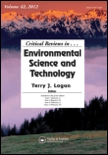
CRITICAL REVIEWS IN ENVIRONMENTAL SCIENCE AND TECHNOLOGY
Championing Rigorous Reviews in Environmental ScienceWelcome to CRITICAL REVIEWS IN ENVIRONMENTAL SCIENCE AND TECHNOLOGY, an esteemed journal published by Taylor & Francis Inc. This journal has been at the forefront of environmental research since its inception in 1993, spanning a wide range of disciplines including environmental engineering, pollution control, waste management, and water science. CRITICAL REVIEWS holds an impressive Q1 ranking in multiple categories, including Environmental Engineering and Pollution, demonstrating its critical role in advancing knowledge within the field. With a remarkable Scopus ranking—placing it in the top 1% for Environmental Science categories—this journal serves as an invaluable resource for researchers, professionals, and students alike, providing comprehensive reviews and analyses that catalyze innovative solutions to pressing environmental challenges. Though currently not open access, the journal's content is accessible through various academic platforms, ensuring that cutting-edge research is available to a global audience. Join the community of scholars dedicated to enhancing our understanding of environmental science and technology through rigorous investigation and critical discourse.
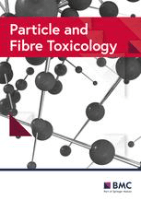
Particle and Fibre Toxicology
Illuminating the effects of environmental agents.Particle and Fibre Toxicology is a leading open-access journal dedicated to advancing the field of toxicology, specifically focusing on the health impacts of particulate matter and fibers. Published by BMC since 2004, this journal operates from its offices in the United Kingdom and has gained significant recognition in the scientific community, achieving an impressive impact factor that highlights its relevance and influence. As indicated by its Q1 ranking in various categories including Health, Toxicology and Mutagenesis and Medicine (miscellaneous), it occupies a prestigious position in the academic landscape, appealing to researchers, professionals, and students alike. With a Scopus ranking of #4 in Toxicology and #7 in Environmental Science, the journal ensures high visibility and accessibility, providing a platform for the dissemination of key research findings and innovative methodologies in the interdisciplinary domains of toxicology. Through its commitment to open access, Particle and Fibre Toxicology fosters knowledge-sharing and collaboration, facilitating significant advancements in our understanding of the toxicological effects of environmental agents.